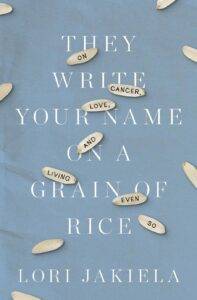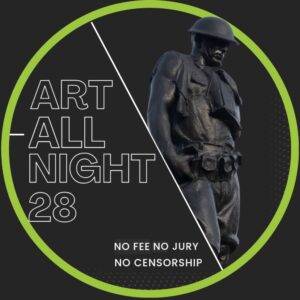“(Jakiela) is an exceptionally talented writer who is only one New York Times book review away from a national reputation.” – Tony Norman, The Pittsburgh Post-Gazette
From the Publisher: “They Write Your Name on a Grain of Rice—the latest book from award-winning Pittsburgh author Lori Jakiela–is much more than a cancer memoir. It’s a pause between polarities. Cancer is almost an afterthought. Inspired by Amy Krouse Rosenthal’s Encyclopedia of an Ordinary Life, it celebrates the tiny moments that make up a time capsule of a life.
A weirdly funny book about mortality, Rice is also about family, genetics, nature vs. nurture, the Rust Belt, EPA clean-up zones, emotional support peacocks, box turtles, Emily Dickinson, Lynyrd Skynyrd, Andy Warhol(a), and so much more. A fresh voice aligned with the work of classic stream-of-consciousness writers like Richard Brautigan and Virginia Woolf, Jakiela explores the way a mind works—complete with leaps and spirals—while reflecting on a life thoroughly lived against a dire breast cancer diagnosis.
Half new and selected essays, half spiraling memoir, Rice is experimental in both voice and form, and offers a fresh approach to age-old questions about life, love, mortality, and the fine art of living, even so.”
More info Don’t miss out: Join Lori Jakiela on Thursday, Oct. 26, 2023 at The Brillobox in Lawrenceville for a double book launch party! She’ll be celebrating her latest alongside Jane McCafferty, who will be launching her debut collection (The Sea Lion Who Saved the Boy Who Jumped From the Golden Gate) + friends. Doors will open at 7 p.m. Free and open to everyone!
Book Party About the Author: “Lori Jakiela is the author of three other memoirs, as well as two poetry collections, an essay collection, and several limited-edition chapbooks. Her work has appeared in The New York Times, The Washington Post, The Chicago Tribune, The Pittsburgh-Post Gazette, The Rumpus, Brevity, Vol 1 Brooklyn, and elsewhere. She received the Saroyan Prize from Stanford University in 2016 for Excellence in International Literature (for her memoir Belief Is Its Own Kind of Truth Maybe) and multiple Golden Quill Awards from the Press Club of Western Pennsylvania, among other honors. Her work has been featured on The New York Times’ “Modern Love” podcast, where actress Kristin Bell read Jakiela’s essay, “The Plain Unmarked Box Arrived.” Jakiela can be seen locally in the PBS documentary, “People Who Write Books Around Here,” by Pittsburgh legend Rick Sebak. She writes a column, “Let Yourself Go,” for Pittsburgh Magazine and directs the undergraduate writing program at the University of Pittsburgh at Greensburg, where she is a professor of English and Creative/Professional Writing. She lives in Trafford, Pennsylvania—her hometown, the last stop in Pittsburgh’s Electric Valley—with her husband the author Dave Newman and their children. For more, visit http://lorijakiela.net.”
Author Site “Lori Jakiela is the queen of the wise one-liner. Fiercely sad and heartbreakingly funny.” – Stewart O’Nan, award-winning author of Ocean State, Emily Alone, and more
“(Jakiela’s) prose is honed to perfection, sure, but it really is her big heart and wisdom about the stupid, terribly imperfect, beautiful world that makes me want to read everything she writes.” – Greg Bottoms, author of Angelhead, Pitiful Criminals, Fight Scenes and more
Author’s Note:
Writers, like Hollywood people, are supposed to have an elevator pitch—a line you say in case you end up stuck in an elevator with your dream literary agent, or, better, Sean Penn, that rough angel, or Wes Anderson, or Jane Campion.
Not Harvey Weinstein, that giant skin tag, dear god.
I lived in New York for years. Elevators are scary places. Muggers. Guys who pull their dicks out. Kids who hit the buttons for all the floors, just because. People who fart freely.
Elevators fail more often than you may know. An elevator failing could mean it’s stuck. It could mean falling some number of floors or worse.
My beautiful friend Senora fell four floors in a New York elevator once. It took her many years with specialists and a chiropractor to get her spine steady again.
* * *
When an airplane I was in dropped 10,000 feet in seconds, when I was thrown a few rows, Senora gave me the name of her chiropractor. He was a tiny man who climbed my back like a spider monkey. He worked my spine until all the bones clicked in place like Scrabble tiles.
I love Scrabble. I love Words with Friends. I love words, though their power is limited, I know.
“To me, the greatest pleasure of writing is not what it’s about, but the music the words make,” Truman Capote said.
* * *
Truman Capote hung out with Andy Warhol, who shows up in this book again and again,
Andy Warhola, with the “a,” was from Pittsburgh, Pennsylvania. He dropped the “a” when he moved to New York and denied his roots.
Fuck you, Andy Warhola. Home is home.
Andy Warhol was a great artist but a questionable human.
Truman Capote was a brilliant writer but a questionable human.
Truman said he didn’t care what anyone said about him as long as it wasn’t true.
Andy Warhol said he wanted to be a robot.
Andy Warhol’s grave in Pittsburgh says, “Figment.”
* * *
Bless you, Truman.
Bless you, Andy.
Bless all of us figments.
* * *
I hope you’ll find some music in this book.
Maybe that’s an elevator pitch: this is a book with music in it I hope you’ll hear.
Nah.
* * *
In the building I lived in during my years in New York, my super told me all the elevator inspections were faked, just like the pesticides he supposedly sprayed to kill cockroaches.
Pesticides were, apparently, expensive. Water wasn’t.
“We give them a nice shower,” my super said about the roaches, who didn’t seem to mind the spritz.
Fun fact: Cockroaches love toothpaste. If you live in New York, remember to keep your toothbrush in the refrigerator—one of the few places roaches won’t look for snacks.
* * *
About elevators.
Senora took the stairs a lot.
I took the stairs a lot.
* * *
In the building I lived in, my friend Moose, who I loved even though he did time in and out of jail, an experience he called “three hots and a cot”–hot meals, a place to sleep, the peace and security of that, even so–was legendary for once dangling a guy over an elevator shaft.
The guy owed some people money. Moose worked for those people the guy owed money to, so it goes.
“I wouldn’t never drop nobody on purpose,” Moose, my otherwise gentle friend, said.
The guy Moose dangled was fine, I think.
* * *
An elevator pitch is a sentence that says what a book, which is kind of an elevator stuck full of words, is about.
This book you’re kind enough to hold—thank you–is a meandering, spiraling map of sorts.
That is the worst elevator pitch in the history of elevator pitches.
Sorry, Sean Penn.
Sorry everyone.
* * *
What you’re about to read—thank you–is a map of mortality, of a mind distracted by ordinary things like cancer and breasts, of airplanes and emotional-support animals, of family and loss, of EPA clean-up zones, of Lynyrd Skynyrd and Einstein’s brain, of the tender humans and writers who fill my heart, of lost bedazzled turtles and homing pigeons and how we’re all connected even so.
* * *
Back when people had to use maps and not Google to get around, I got lost constantly. My sense of direction takes me left when I should go right, and once and a while, I veer purposely off-course, like that time when I was headed to Ohio but figured New York City was just a bit further down the road and so. Or that time I was headed to Harrisburg but figured that was halfway to New York City and so. Or that time I was in Philly and figured just one more bridge.
God how I love New York.
How I love Pittsburgh, my home country.
* * *
No matter how many years I lived in New York, Moose called me “Pittsburgh.”
“Hey Pittsburgh,” he’d say. “What you got for me?”
I’d bring Moose chocolates I’d buy overseas. He wasn’t supposed to have them, Methadone, etc., but Moose loved chocolate, and our time with one another is so short.
This is a book about that, too.
* * *
“I’ll say a prayer for you, Pittsburgh,” Moose would say and throw up a gang sign.
“Yo, Pittsburgh,” Moose would say and give me the finger, but sweet like.
I love this world, this life.
Don’t you?
* * *
“We’re born, we live a while, we die,” E.B. White’s Charlotte the Spider said.
Temporary, temporary.
Everything and everyone we love.
Still.
Even the darkness is lit through with glitter and shine.
This excerpt is published here courtesy of the author and publisher and should not be reprinted without permission.


























